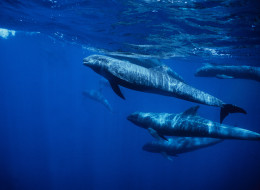Exxon Sonar Surveying Blamed for the Deaths of 100 Whales Near Madagascar
ANIMAL RIGHTS - VEGETARIANISM, 30 Sep 2013
Agence France Presse – Huffington Post
A noisy technology that blasts sounds below water to map the ocean for oil is being blamed for 100 melon headed whale deaths off Madagascar, experts said Thursday [26 Sep 2013].
An independent panel of scientists found that sonar surveying by ExxonMobil in late May 2008 led to the sudden displacement of the whales, which became stranded and died.
“This is the first known such marine mammal mass stranding event closely associated with relatively high frequency mapping sonar systems,” said the report released by the International Whaling Commission.
“Earlier such events may have been undetected because detailed inquiries were not conducted.”
The researchers described a “highly unusual event” in which about 100 melon headed whales became stranded in shallow waters in the Loza Lagoon system in northwest Madagascar in May and June 2008.
“This typically open ocean cetacean species had never previously nor since been reported in this shallow tidal estuarine system, nor in any other in Madagascar,” said the study.
The culprit was named as a “high power 12 kHz multi beam echosounder system (MBES)” operated by an Exxon Mobil vessel on May 29 about 65 kilometers (40 miles) offshore from the first known stranding.
The five-member independent scientific review panel said the vessel’s operation was “the most plausible and likely behavioral trigger for the animals initially entering the lagoon system.”
The sounds would have been “clearly audible over many hundreds of square kilometers of melon headed whale deep water habitat areas.”
The advocacy group Oceana said the findings show how dangerous the technology can be to aquatic animals.
“Seismic blasts can disturb the vital behaviors of dolphins and whales such as breathing, feeding, mating and communicating,” said the group’s vice president for US Oceans, Jacqueline Savitz.
“This can quickly turn deadly when animals are startled into rushing to the surface or are driven into shallower areas, where they often die as these whales did.”
A spokesman said ExxonMobil said it does not back the panel’s findings.
“ExxonMobil believes the panel’s finding about the multi-beam echo sounder is unjustified due to the lack of certainty of information and observations recorded during the response efforts in 2008.”
The evidence was compiled by the International Whaling Commission, the US Marine Mammal Commission, the US National Oceanic and Atmospheric Administration, the US Bureau of Ocean Energy Management, ExxonMobil Exploration and Production (Northern Madagascar) Ltd, the International Fund for Animal Welfare, the Wildlife Conservation Society and the Government of Madagascar.
Copyright (2013) AFP. All rights reserved.
Go to Original – huffingtonpost.com
DISCLAIMER: The statements, views and opinions expressed in pieces republished here are solely those of the authors and do not necessarily represent those of TMS. In accordance with title 17 U.S.C. section 107, this material is distributed without profit to those who have expressed a prior interest in receiving the included information for research and educational purposes. TMS has no affiliation whatsoever with the originator of this article nor is TMS endorsed or sponsored by the originator. “GO TO ORIGINAL” links are provided as a convenience to our readers and allow for verification of authenticity. However, as originating pages are often updated by their originating host sites, the versions posted may not match the versions our readers view when clicking the “GO TO ORIGINAL” links. This site contains copyrighted material the use of which has not always been specifically authorized by the copyright owner. We are making such material available in our efforts to advance understanding of environmental, political, human rights, economic, democracy, scientific, and social justice issues, etc. We believe this constitutes a ‘fair use’ of any such copyrighted material as provided for in section 107 of the US Copyright Law. In accordance with Title 17 U.S.C. Section 107, the material on this site is distributed without profit to those who have expressed a prior interest in receiving the included information for research and educational purposes. For more information go to: http://www.law.cornell.edu/uscode/17/107.shtml. If you wish to use copyrighted material from this site for purposes of your own that go beyond ‘fair use’, you must obtain permission from the copyright owner.
Read more
Click here to go to the current weekly digest or pick another article:
ANIMAL RIGHTS - VEGETARIANISM:
